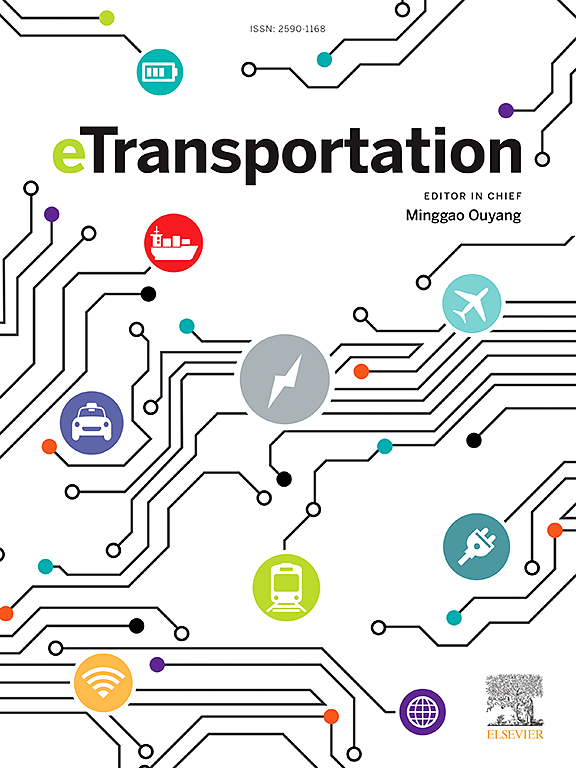Enhancing fast-charging protocols with section-based Bayesian optimization for lithium-ion batteries to prevent Li-plating
IF 17
1区 工程技术
Q1 ENERGY & FUELS
引用次数: 0
Abstract
This study presents a model-based optimization framework for fast-charging protocols in lithium-ion batteries (LIBs), combining a physics-based electrochemical model with Bayesian optimization (BO). Two BO-based multi-step constant current (MCC) protocols, namely a single-section and a bi-section strategy, were developed and experimentally validated using a commercial 55.6 Ah pouch-type LIB cell under various conditions. By incorporating physics-informed safety constraints such as Li-plating potential, voltage, and temperature, the proposed BO-MCC protocols reduced charging time by up to 20 percent compared to the conventional constant current constant voltage (CCCV) method, while maintaining plating-free operation and thermal stability. In particular, the bi-section strategy further reduced charging time by up to 11 percent relative to the single-section approach, while effectively suppressing Li-plating and SEI growth. Furthermore, under a high-temperature condition with pre-heated cells at 60 °C, the BO-MCC protocol enabled charging from 0 % to 80 % state of charge within 629 s, thereby satisfying the USABC target for extreme fast charging. Finally, experimental cycling and post-mortem analyses confirmed that the BO-MCC protocols mitigate capacity degradation more effectively than the CCCV method. This work provides a practical and experimentally validated framework for designing efficient and safe fast-charging strategies for electric vehicle(EV) batteries operating under diverse thermal conditions.
基于分段贝叶斯优化的锂离子电池快速充电方案,防止镀锂
本研究提出了一种基于模型的锂离子电池(lib)快速充电协议优化框架,将基于物理的电化学模型与贝叶斯优化(BO)相结合。开发了两种基于bo的多步恒流(MCC)方案,即单段和双段策略,并在不同条件下使用商用55.6 Ah袋型LIB电池进行了实验验证。通过结合物理安全约束,如镀锂电位、电压和温度,与传统的恒流恒压(CCCV)方法相比,拟议的BO-MCC方案可将充电时间缩短20%,同时保持无电镀操作和热稳定性。特别是,与单段方法相比,双段策略进一步减少了11%的充电时间,同时有效地抑制了锂电镀和SEI的生长。此外,在60°C的高温条件下,BO-MCC协议可以在629 s内实现从0%到80%的充电状态,从而满足USABC极限快速充电的目标。最后,实验循环和事后分析证实,BO-MCC协议比CCCV方法更有效地缓解了容量退化。这项工作为设计在不同热条件下运行的电动汽车(EV)电池高效、安全的快速充电策略提供了一个实用且经过实验验证的框架。
本文章由计算机程序翻译,如有差异,请以英文原文为准。
求助全文
约1分钟内获得全文
求助全文
来源期刊

Etransportation
Engineering-Automotive Engineering
CiteScore
19.80
自引率
12.60%
发文量
57
审稿时长
39 days
期刊介绍:
eTransportation is a scholarly journal that aims to advance knowledge in the field of electric transportation. It focuses on all modes of transportation that utilize electricity as their primary source of energy, including electric vehicles, trains, ships, and aircraft. The journal covers all stages of research, development, and testing of new technologies, systems, and devices related to electrical transportation.
The journal welcomes the use of simulation and analysis tools at the system, transport, or device level. Its primary emphasis is on the study of the electrical and electronic aspects of transportation systems. However, it also considers research on mechanical parts or subsystems of vehicles if there is a clear interaction with electrical or electronic equipment.
Please note that this journal excludes other aspects such as sociological, political, regulatory, or environmental factors from its scope.
 求助内容:
求助内容: 应助结果提醒方式:
应助结果提醒方式:


